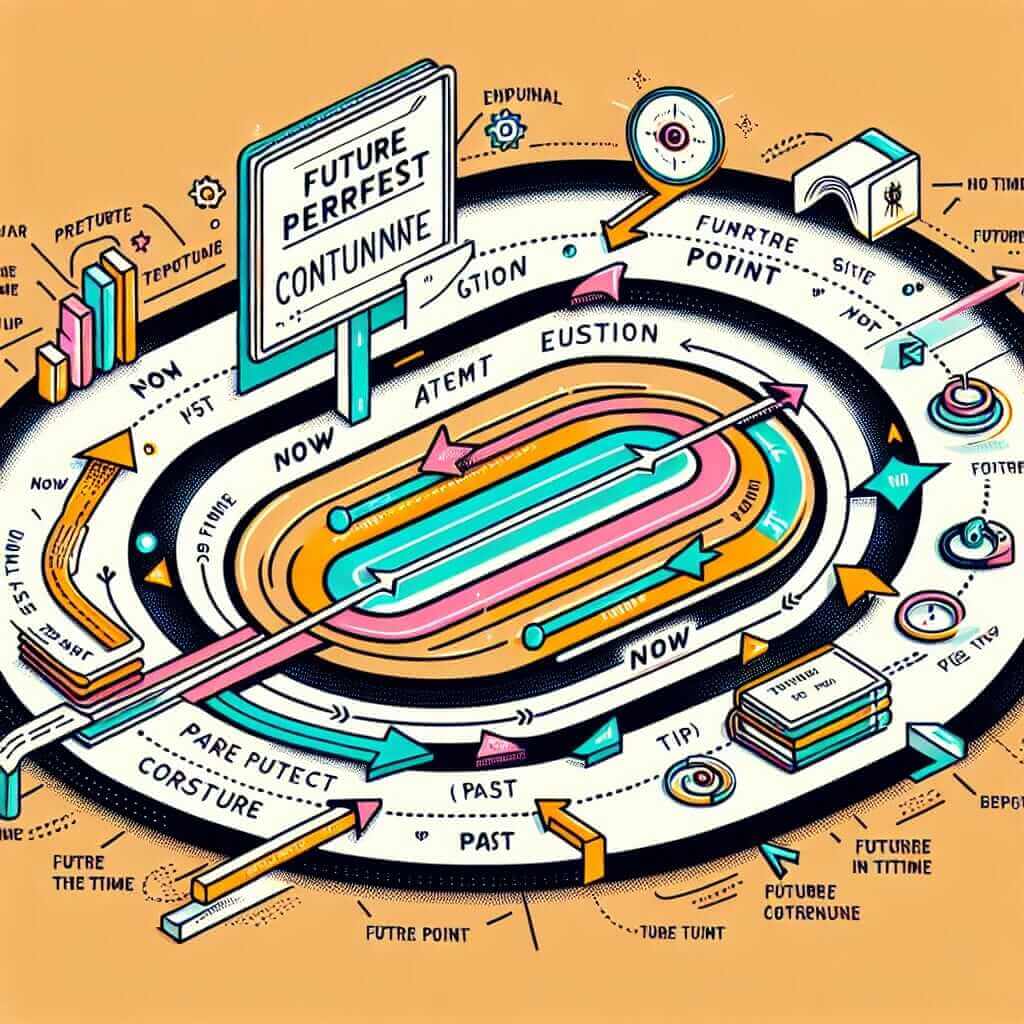The future perfect continuous tense might seem a bit daunting at first, but mastering it can truly elevate your grammatical range and accuracy in the IELTS exam. This tense is particularly useful for describing actions that will be in progress at a specific time in the future.
Here are a few examples of how you might encounter or use the future perfect continuous tense in different sections of the IELTS:
- Speaking Part 2: “By this time next year, I will have been studying English for five years.”
- Writing Task 1: “The graph indicates that the consumption of fast food will have been increasing steadily for a decade by 2030.”
- Listening Section 3: You might hear a speaker say, “By the time we reach London, we will have been driving for six hours straight.”
Let’s break down each sentence to see the future perfect continuous in action:
- In the first example, the speaker uses the future perfect continuous (“will have been studying”) to emphasize the ongoing nature of their English studies leading up to a specific point in the future (“this time next year”).
- The second example uses the future perfect continuous (“will have been increasing”) to highlight a trend that will continue for a specific duration (“for a decade”) before a future point in time (“by 2030”).
- The third example demonstrates how the tense is used to describe an action (“driving”) that will be ongoing for a certain period (“six hours”) before a future event (“reach London”).
Understanding the Future Perfect Continuous
While not as common as other future tenses, the future perfect continuous tense still plays a crucial role in expressing specific future scenarios in the IELTS exam. It is often used to describe actions that will continue for a period of time up to a particular point in the future. This tense effectively emphasizes the duration of an action, highlighting its ongoing nature.
For instance, imagine you are asked in the IELTS Speaking test about your future career plans. Instead of simply stating “I will work as a doctor,” you can use the future perfect continuous to provide a more nuanced and impressive response: “By the time I turn 30, I will have been working as a doctor for three years.” This sentence not only conveys your future profession but also emphasizes the duration of your experience in the field.
Structure and Usage in IELTS
Formula:
will + have + been + present participle (-ing form of the verb)
Breaking Down the Structure:
- will: This modal verb indicates the future tense.
- have + been: These auxiliary verbs are essential for forming the future perfect continuous tense.
- present participle: The -ing form of the main verb emphasizes the ongoing nature of the action.

Usage in Different IELTS Sections:
Speaking:
-
Part 1: Provides detailed responses to questions about your personal experiences and opinions.
Examiner: “What are your plans for the summer?”
You: “By August, I will have been traveling around Europe for a month.” -
Part 2: Creates vivid and engaging narratives when describing events or experiences.
Topic: Describe a time you helped someone.
You: “By the time she finished her exams, I will have been helping her study for weeks.” -
Part 3: Expresses your thoughts on more abstract topics and allows for complex sentence structures.
Examiner: “What do you think the impact of artificial intelligence will be on the job market?”
You: “In a few decades, I believe AI will have been transforming the way we work for many years.”
Writing:
-
Task 1 (describing trends): Emphasize the ongoing nature of changes depicted in graphs, charts, or diagrams.
“The data suggests that the population of this city will have been growing steadily for two decades by 2050.”
-
Task 2 (expressing future consequences): Highlight the continuous impact of an issue or event.
“If deforestation continues at this rate, we will have been destroying vital ecosystems for years to come.”
Listening and Reading:
Understanding this tense is crucial for comprehending complex sentence structures and inferring meaning from the context. You will encounter this tense when speakers or writers describe actions that will be ongoing at a specific point in the future.
Tips for Achieving Band 7+
To impress the IELTS examiner and achieve a higher band score, consider these tips:
- Use a variety of tenses: While the future perfect continuous is important, avoid overusing it. Demonstrate your grammatical range by using other tenses appropriately.
- Maintain accuracy: Pay close attention to the correct verb forms and word order when using this tense. Even a small mistake can lower your score.
- Context is key: Only use the future perfect continuous when it makes sense in the context. Don’t force it into sentences where other tenses might be more suitable.
Common Mistakes to Avoid
Here are some common errors students make with the future perfect continuous:
-
Incorrect auxiliary verb form: Using “will have being” instead of “will have been.”
Incorrect: “They will have being living in London for five years.”
Correct: “They will have been living in London for five years.” -
Omitting the -ing form: Forgetting to use the present participle after “been.”
Incorrect: “She will have been study English for two years.”
Correct: “She will have been studying English for two years.” -
Using the wrong tense: Confusing the future perfect continuous with other future tenses.
Incorrect: “By next month, I will finish my project.” (This should be future perfect simple: “By next month, I will have finished my project.”)
Conclusion
Mastering the future perfect continuous tense is an excellent way to showcase your command of English grammar in the IELTS exam. You can find more practice exercises and examples related to this tense and other helpful grammar topics on websites like IELTS.net. By understanding its structure, usage, and common pitfalls, you can confidently incorporate this tense into your speaking and writing, leading you one step closer to achieving your desired IELTS score.